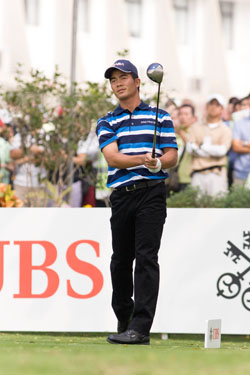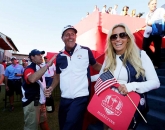Colin Montgomerie courted controversy ahead of the recent US Masters after the Scot blasted the tournament organisers for handing invites to China's Liang Wen-chong, Indian Jeev Milkha Singh and Prayad Marksaeng of Thailand while he was left to put his feet up and watch the season's first major from the comfort of his own home.
The 44-year-old, not unaccustomed to speaking his mind at times, felt he had been overlooked for a place at Augusta in favour of the Asian trio purely on commercial grounds rather than sporting talent.
 “If I were the only person in the country, a la China, I might get in,” he told reporters in Munich while promoting June's BMW International Open ahead of the Masters. "It's a strange way to make up a field for a major championship - TV rights.
“If I were the only person in the country, a la China, I might get in,” he told reporters in Munich while promoting June's BMW International Open ahead of the Masters. "It's a strange way to make up a field for a major championship - TV rights.
“They are quite open about why, just as they were when I missed out last time in 2005, when they picked Shingo Katayama, then 67th in the world. I was 51st at the time. They picked him over me for the Japanese TV rights.
“Let me tell you, I am not the only one who feels this way. In or not, I would be saying the same thing.
“It is the only one [of the four majors] you can get invited to - you don't get an invite to The Open or the US Open or the US PGA. You have to qualify. But the Masters has its own rules. It would be easier to swallow if no one was invited and the entry list was based on sporting and not commercial criteria.”
Now Montgomerie may feel he has earned the right to air his views as an eight-time winner of the European Order of Merit and a player widely regarded as the best never to win a major championship. But his remarks seem at odds with the fact that the former Hong Kong Open, Singapore Masters, Macau Open and TCL Classic winner is regularly invited to compete in Asian tournaments, often with the lure of a financial incentive, and his presence has done as much as anyone to boost the profile of the game in this part of the world.
Indeed golf is one of the fastest-growing sports in the region, something Monty clearly recognises having designed a number of courses in China. So he can hardly be surprised that as his career enters its twilight years, he finds himself competing with the likes of Liang and others for invites to the big tournaments. And even if other factors are taken into account, it is no different as to why the burly Scot is still asked to play in Asian tournaments despite his recent decline. It cuts both ways and his reaction to his Masters snub could be described as hypocritical at best.
But from a merely sporting point of view, his comments also seem a little misplaced. True, it could be argued they were borne out by the fact Liang missed the cut and Prayad withdrew due to injury. But most players struggle on their first visit to the intimidating Augusta layout. Even the mighty Tiger Woods only managed a tie for 41st and a missed cut in his first two appearances. The impressive Singh, on the other hand, actually improved on his 2007 debut by 12 places after finishing in a tie for 25th. Liang became only the second Chinese golfer to feature at the Masters but his inclusion was more than a novelty, he deserved his place on merit. He became only the second player from the mainland to win a European Tour event when he triumphed in last year's Singapore Masters and the first to lead the Asian Tour's Order of Merit when he topped the money list the same year. This term, he has enjoyed top 10 finishes in Indonesia and at the Volvo China Open and ended in a tie for 14th at the BMW Asian Open, while the
30-year-old has consistently led the Asian challenge whether on the European, Asian or Japanese tours in recent times.
Montgomerie, by contrast, has found it tougher and tougher to compete and although his world ranking may currently be higher than Liang’s, it is only a matter of time before the latter overtakes the former.
Masters chairman Billy Payne was in no doubt he had made the right decision.
“These three individuals are successful, accomplished and talented golfers deserving of a Masters invitation,” Payne said. “They are outstanding representatives of their respective countries. There remains, we believe, an untapped opportunity in Asia where amateur golf has its greatest growth potential.
“We want to pursue the development of amateur golf for the purpose of creating heroes and legends among the representative countries, establishing role models who attract other kids to the game.”
Golf is rapidly becoming a global sport and Montgomerie has contributed greatly to the development of the game in Asia. He has thrilled crowds all over the region and undoubtedly inspired more than one youngster to pick up a set of clubs. So it would be a shame if he were to continue to tarnish that legacy as his own great career draws to a close.
Click here to see the published article.











